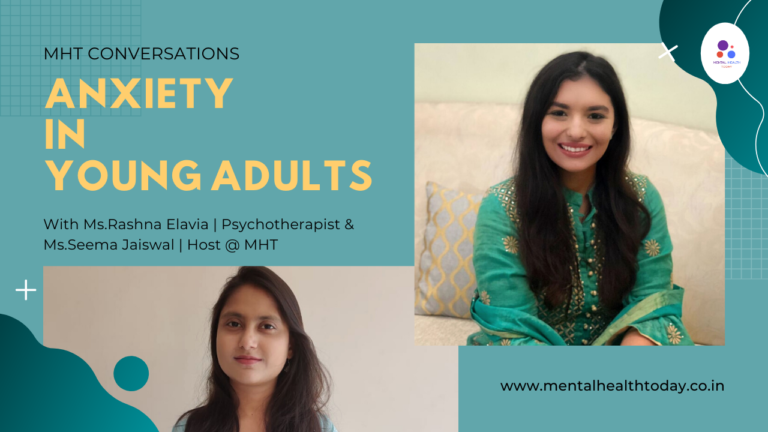Anxiety disorders are getting more and more prevalent amongst children and young adults. It is quite possible that you or one of your peers or relatives might be going through a kind of anxiety disorder. Being aware of the signs and symptoms of anxiety can greatly help young adults seek right help at the right time. Ms.Rashna Elavia, a psychotherapist, joins MHT Conversation to talk about the same.
About Ms.Rashna Elavia
Rashna is a Clinical Psychologist & Psychotherapist with experience in psychotherapy, diagnosis and psychometric testing. She works with young adults across various issues to help them overcome life obstacles in a healthy way. Additionally, she also delivers workshops on mental health and has published a blog called “A Warm Winter Sun”.
Watch the full video: Anxiety in Young Adults | MHT Conversation with Ms.Rashna Elavia
What is anxiety?
First of all – anxiety is extremely common, especially among young adults. A lot of people experience tension, worrying at different points in life. However, anxiety becomes a problem or becomes a disorder when a person experiences persistent worry which may not have a logical or factual basis. This type of anxiety is excessive and hard to control. One very important feature of anxiety is that it causes a lot of distress and it interferes with everyday life.
Ms.Rashna further explains anxiety with the example : suppose you have a test, you’re worried but that’s motivating you to study harder and perform. However, when you’re feeling anxious you’re preoccupied with various bodily sensations, distressing thoughts and inability to concentrate. Do you see how these symptoms could act as hurdles even in your day to day responsibilities?
How can treatment support anxiety in young adults?
Treatment through therapy is a huge part of managing anxiety in young adults. The goal is to support you enough and equip you with skills so that they can then be managed independently. Therapy treatment for anxiety never have a one-size-fits-all approach but usually, psychologists work on:
- Thoughts: we like to go to the heart of the problem and find out the irrational beliefs that are causing the discomfort. As people, we all usually have certain thinking errors and we together identify those errors and teach you to look at life in a more balanced manner. You have to challenge the negative thoughts and show them who’s boss!
- Somatic/relaxation work: Therapy also uses the body to send signals to the mind that everything is okay or that you have the ability to manage the stressor. Relaxing your body usually sends “Slow down” signals to the mind and then helps you calm down in the long run. Breathing exercises and visualisations are our weapons to fight anxiety.
- Working on tolerating the distress is also a therapeutic skill. Most of the time we live in the past or the future and aren’t really living the present moment. Shifting that focus towards things that we CAN control i.e. the present, is a part of mindfulness taught via therapy.
Ms.Rashna also mentions that treatment through therapy is always case-by-case and your therapist could use everything from art and music to change how you see yourself. What psychologists absolutely do though is break down the long-lasting dysfunctional patterns and build a sustainable one.
Some more resources that can support the treatment of anxiety in young adults are shared by Ms.Rashna Elavia towards the end of this MHT Conversation. Regardless of how real the stressor is, anxiety can be an exaggerated response to it. You have to ask yourself, regardless of how anxious you are, “how much is this anxiety helping me right now? Is it harming me?”. Your answer will be yes because anxiety is causing you to be nervous so much so that all the resources that you have are being used to maintain your anxiety. I’ll leave you with a couple of hacks:
The acronym THINK personally helps Ms.Elavia:
T – Is the thought True
H – Is it helping or harming me?
I- Is it inspiring action or causing me to freeze up?
N- Is it absolutely necessary to think this way? What another way can it be?
K – Is it a kind thought? If not, how can I make it kinder?
Belly Breathing causes you to slow down your nervous system. Take deep slow breaths from your belly for 5-10 mins.
Create a list of “rainy day” affirmations which are basically powerful words that always give you strength
Focus on the things that you CAN control rather than those that are out of your control
About MHT Conversation
MHT Conversations has been conceptualized with the aim to create a safe place for our speakers that is free of any kind of judgements. It is an online space where anybody from the mental health community or otherwise can come together and converse about topics that are relevant to the field of mental health. Ranging from personal anecdotes, struggles with mental illness, surviving through different low points in one’s life to experts giving their views on different therapies, disorders and even stigma related to the field, MHT Conversations includes it all and beyond.
These conversations are recorded at the time convenient to the speaker/s and published on the website only after obtaining appropriate consent. Mental Health Today takes pride in being an all-inclusive platform and invites all individuals, regardless of their caste, race, colour, sexual orientation, religion or gender to come on board MHT Conversations and help us in building an all-accepting community.
The recordings of MHT Conversations, along with short clips from the same, are also streamed on all of the MHT India’s social media platforms:
Subscribe to MHT India and become a part of the community. Get weekly updates on new MHT Blogs, MHT Podcasts and MHT Webinars from Mental Health Today. If you are seeking the help of a professional, explore the MHT Directory and find an expert can support your needs and requirements. Explore various products at MHT Store that can assist you to overcome your emotional or psychological or mental health problems.
Team MHT India hopes you found this conversation helpful and informative. Stay tuned for more such content coming up. Kindly like, share and subscribe to MHT India’s social media handles. If you wish to join as a speaker for our next conversation, kindly send us an email at:
support@mentalhealthtoday.co.in



